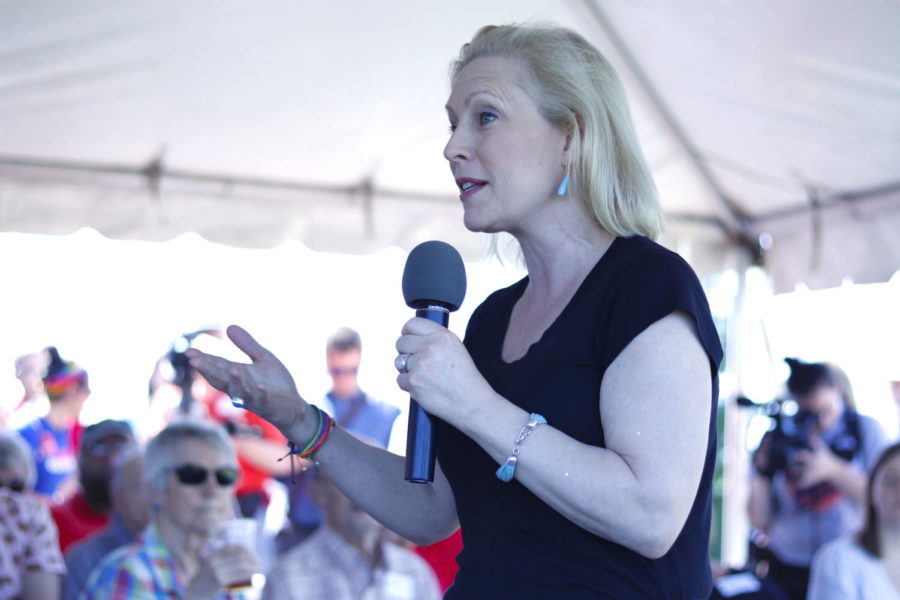Berch: The men of ‘Me Too’ return to public life while women continue seeing consequences
Former democratic presidential candidate Sen. Kirsten Gillibrand makes a campaign pitch during the Big Tent on the Prairie event June 8 at Alluvial Brewing.
August 29, 2019
Sen. Kirsten Gillibrand, a leading Congressional voice on women’s rights, ended her bid for president Wednesday after failing to qualify for the third presidential debate.
Gillibrand was famously the first Democratic senator to call for Democratic then-Sen. Al Franken’s resignation after eight women accused him of sexual harassment and groping. While other Democratic senators quickly followed, several have since said they were too harsh on Franken and blamed Gillibrand for knocking a rising star in the Democratic Party out of congressional politics.
Throughout her eight-month candidacy, Gillibrand repeatedly cited her position in Franken’s resignation as a reason many establishment donors ignored her, both in campaign memos and interviews.
Meanwhile, as Gillibrand bows out of the race, Franken is returning to public speaking.
Although his time in office is over, it will certainly serve as a point of interest in his speaking engagements — earning him a profit.
Franken isn’t the first man accused of sexual misconduct to resume careers in the public eye. Aziz Ansari released a new Netflix special in July. Louis C.K. also returned to comedy less than a year after allegations surfaced against him.
There have been others who have seen little, if any, repercussions. The past three years have proven that sexual assault allegations aren’t enough to stop a person from being elected president or earning a seat on the Supreme Court.
The deepest irony — at least, for me — comes from one reason people often give into excusing the accused men: “she’s just accusing him for the fame.”
According to Business Insider, more than 20 women have accused President Donald Trump of sexual misconduct. Before you click on that link, can you name even half of them? I can’t.
One of the most famous accusers of the Me Too era, Christine Blasey Ford, certainly hasn’t earned public popularity for her role. According to NPR, she continued to receive threats after her Senate hearing. She’s had to move multiple times and she hasn’t been able to return to her job as a professor.
The point is: we can all name men who have made headlines throughout the Me Too movement — Harvey Weinstein, Matt Lauer, Kevin Spacey. The accusers, however, fall to the bottom of the news stories and the backs of our minds. As a result, they face a particularly heinous set of repercussions for speaking out, whether as a victim or on behalf of one.
The news media has a responsibility to fairly and accurately cover these allegations, without reporters making their own judgements on these situations. However, they also have a duty to those whose stories they are telling — to value both the vulnerability and the bravery in speaking out against someone in a position of power.
And when speaking about these issues, we all have to value those stories over politics and celebrity.

















